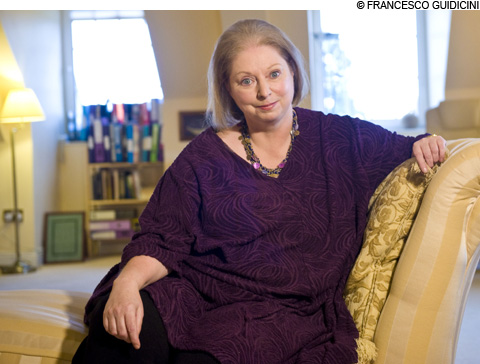
DANGEROUS JOB Hilary Mantel's sequel to her Booker Prize–winning Wolf Hall continues to follow
the career of Henry VIII's right-hand man, Thomas Cromwell. |
Endings, perhaps more than beginnings, set the tone in historical fiction. Any story of a human life ends in death. That doesn't mean a chronicler has to follow the tale through. Take Hilary Mantel's Wolf Hall, for example. This juicy banquet of a novel made a hero out of Thomas Cromwell, longtime chief minister for England's Henry VIII, a man best known — until Mantel's 2009 Booker-winning treatment — as the scheming villain of A Man for All Seasons. Mantell's lovely brick treated Cromwell as the ultimate self-made man, chronicling his engineering of Henry's divorce from Katherine of Aragon, a split that also severed England from the Catholic church, and concluding with the execution of Cromwell's arch rival, the seasonal Thomas More. The collapse of Cromwell's greatest project — Henry's second marriage, to Anne Boleyn — is hinted at, as the book winds up around page 650, but it is the battle between the great statesmen that preoccupies Mantel.
More is two months dead by the time Bring Up the Bodies opens in September, 1535, although he is still very much on Cromwell's mind, and Anne is clearly on the decline. But in this second hefty volume, the forces set in motion continue to play out. The conservatives — secret Catholics as well as old Yorkists who still resent the Tudor ascent — are out to get our hero. And students of history know they will — Cromwell was beheaded for, among other crimes, treason and heresy in 1540. But that's the stuff of another book (a third is planned). Bring Up the Bodies focuses on Cromwell's consolidation of power over the course of one year as he balances the king's whims and other treacherous forces to bring down one queen and set the stage for a third, Jane Seymour.
Henry wants a son; the young Tudor dynasty needs an heir. And Cromwell's job — his only real duty — is to realize the king's desires. His personal tragedy — the death of his wife and two daughters — is incidental to this, and as Mantel picks up the thread, Cromwell is hunting with the king, using falcons that he has named for the lost women in his life.
"His children are falling from the sky," the book begins, setting a tone of loss and of duty. As in Wolf Hall, the pronoun almost invariably refers to Cromwell, in what is nearly stream-of-consciousness, and Mantel presents him with pinpoint detail. When Cromwell is not the center of this narrative — the "he" — it is because thoughts of More, or of Henry, have taken precedence. It's enough to make a man envy the dead. "Their lives are simple. When they look down they see nothing but their prey . . . a flittering, unflinching universe, a universe filled with their dinner."Bring Up the Bodies, like its predecessor, is a study of thought, of process. Cromwell should write a book, he is told. "If he did, it would be The Book Called Henry," he notes. "[H]ow to read him, how to serve him, how best to preserve him."